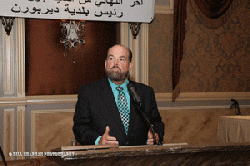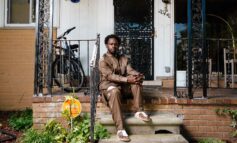DEARBORN — After the passing of the late Mayor Michael Guido in 2006, no one could argue that John B. “Jack” O’Reilly, Jr. didn’t have the experience and know-how that was needed to take over the post of Mayor of Dearborn. O’Reilly and his family are deeply rooted in the City. Their service dates back to when his father was Mayor, from 1978-1986.
O’Reilly chose to follow in his father’s footsteps as a city official and served 17 years as the president of Dearborn’s City Council. In 2007, he had to step into the position of mayor, on the heels of a recession, which has since led his administration to make some tough budgeting decisions, while grappling with a City deficit.
Now, in a bid for a second full term in office, O’Reilly sits down with The Arab American News to discuss the City’s current direction and some key initiatives that he would like to see implemented. He also addresses some long-standing questions, regarding Dearborn’s Arab American community, in an effort to dispel rumors and, what he says, are misconceptions, regarding his administration.
The Arab American News: Looking back on your six-year-tenure as mayor, what would you say are some of your most significant accomplishments, since your time in office?
Mayor O’Reilly: I became mayor at a time when the recession was taking place, and we went through a huge economic downturn. The City lost 30 percent of its revenue and Ford Motors went through a huge transition. The first task was to stay stable and continue to deliver high services with reduced revenue. That challenge was overwhelming, but we managed that pretty well. We had very little loss of service, and we were able to cut over $20 million in structural costs in budget over that period. We were also able to reduce our workforce by quite a bit, without reducing services, so those were major accomplishments.
TAAN: A planned sale of City Hall to ArtSpace has raised some concerns with residents, along with moving the city administration into the ADP building on Michigan Ave. How would you explain the situation to residents?
O’Reilly: I knew about ArtSpace about five years ago and visited some of their sights in New York, Minneapolis and California. I thought they would be perfect for Dearborn. They are really attractive, and they bring such a creative environment with them, along with new people into our City. So, I approached them about coming to Dearborn, and they were interested. They began looking at properties here that had enough square footage to support their project, and City Hall was one of them.
As that went on, a property that’s just at the western edge of the City’s existing property on Michigan and Greenfield went into bankruptcy [The ADP building]. A company in Texas had bought it for $3.1 million, and then they realized that there were covenants that Ford land always puts in the property that they transfer, and they couldn’t get anybody to buy it. Every mayor before me had envisioned moving into a more cost efficient City Administration Center that would be connected to the Library, Police, Court and Performing Arts Center. To maintain the current City Hall is costly, because you are paying for heat and air that is not being used. Off the bat, we are reducing 10,000 square feet and costs will be much lower overtime. We can save $400,000 a year, just in operating costs. That’s a big chunk of money not spent on services. We can also create a much higher level of customer service, and provide an easier way for people to interface with the City.
TAAN: Residents have been vocal about a few ordinances that they feel are infringing on their rights, such as the garage-use ordinance that is currently being amended. What is your overall feeling on this issue?
O’Reilly: Our job is to balance when one person’s rights go over into someone else’s rights, and that’s when it gets to a point where it’s not appropriate. This law with the garage ordinance does not exist yet, and we are trying to balance interest and trying to figure out what is acceptable and what is not. People can do their hobbies, or work on their cars in their garage, but when it goes beyond building code requirements, like with cooking and storing certain appliances, then it can’t be allowed. If you want to go to the garage to smoke or watch TV and have a place outside the house, that’s not going to be prohibited. But your rights end when they begin to violate the rights of others. Every household is required to have two independent off-street parking spaces and must meet Public Service Day requirements, and if those rules are being violated, then it can’t be allowed.
TAAN: Are there any upcoming initiatives, or plans in the City that you are mostly looking forward to?
O’Reilly: The train station puts us in the middle of some real opportunities, as there’s already talks of a commuter rail between Ann Arbor and Detroit. That means that you can go to Ann Arbor to take classes, come back here, and so forth. We have a potential high-speed rail coming in where, in two years; you could take a trip between Dearborn and Chicago in four hours. We would like to market weekend get-away trips to Dearborn. We have less expensive hotels, entertainment and museums. Our ambition is to begin attracting a lot more tourists to come to Dearborn by train and build a customer base.
The University of Michigan-Dearborn (UMD) also plans to increase their student enrollment by 2,000-3,000, and dorms are going to be a big part of that. We have been working for years with UMD, and they were finally able to get private funding for the dorms. 500 beds are already occupied and there are 400 more coming, because now they know the demand is there.

|
| Mayor O’Reilly addresses the local Muslim community at an Iftar dinner that he held at Byblos Banquet Hall in July. |
TAAN: In comparison to ten years ago, many residents would argue that, back then, there seemed to be stronger City services all around, with more libraries and swimming pools. How do you respond to people who say City services are slowly diminishing?
O’Reilly: We hit a recession, and we lost 30% of our revenue. We were lucky that we didn’t cut critical stuff. You look at cities all over Michigan and you’ll find that they have cut police and fire, and they are barely doing things in services. We’ve done very well, considering the circumstances. Nothing is what it was, and it won’t be, because we are changing into a new model. What’s interesting about the libraries is that, while we closed one of them, library activity is actually up. The total amount of people participating now in sponsored programs at Henry Ford Centennial Library is greater than it was with all four libraries combined. We still have more pools per capita than any other community in Michigan, and people are trying to convince others that this is a dramatic loss. People are resistant to change sometimes, but we’re moving forward, towards the future.
TAAN: How is crime trending in the City over these past few years?
O’Reilly: Calls for service are way up since 2007, adding almost 10,000 calls of service per year. But yet, calls in regards to crime are actually down. [466 violent crimes were documented in 2007, compared to a low of 264 crimes in 2011]. We really got a handle on property crimes, because we started a new special operations program. We implemented a totally new approach, and it’s been a great success. We have more officers on their feet, strategically watching areas and catching people, who are often scouting and about to commit crimes. That’s why on Nixle, we send out alerts, because we want people to be careful. We don’t want them to be afraid, but we want them to understand what’s out there, so that they could help us. We are getting a great response from people who are calling in and reporting.
TAAN: Can you elaborate on your relationship with the Arab American and Muslim communities in Dearborn?
O’Reilly: I’m engaged through organizations and leadership in numerous ways, and I communicate with them to seek and resolve issues and problems they have. For example, the Islamic Center of America had a problem with traffic flow on Ford Road, and we got together with the County and the State. Our engineers were able to redesign Ford Road, making it much safer to get in and out. The City put in money to get that done. They key is partnership and looking at problems that need to be solved. We need to be interested in everybody’s needs, effectively and as best as we can, and that means pooling all of our resources together and looking at the future as one community.
TAAN: The Arab International Festival was cancelled this year. You had recommended that it be moved to a more closed in area, such as Ford Woods Park. Any possibility it could return to Warren Ave?
O’Reilly: After the George Saieg case [In 2011, the federal court ruled that it was illegal to bar a Christian evangelist from passing leaflets on public sidewalks], there was a different standard set for public property, such as Warren Ave. There’s no way we can guarantee safety, or that the event could be managed effectively, because the standard had changed. That’s when I first said, there’s too much liability and risk, and we have to move it to a closed site. As long as people can come in and do business in the area and access the same sight of the festival, then you can’t have any restrictions. People have the right to do anything at that festival sight. I have to look out for the City’s interest, and I have to protect the City. The only solution was to relocate. I understand that the American Arab Chamber of Commerce decided to take a breather, and my goal is to still support the Chamber, 100%, and work with them in any way we can.
TAAN: You did not seek an endorsement from the Arab American Political Action Committee (AAPAC) in the run-up to the Primary this year. Why is that? Some Arab Americans have criticized some of your opponents as being too inexperienced and would have liked to hear some of your platform items.
O’Reilly: Well, I do plan to take my message directly to the people. For me, I went to AAPAC in 2011 and approached them about endorsing a temporary millage. But when I got there, they didn’t want to ask about that. I felt that their alignment and objectives were different. They did come out and oppose the temporary millage, and they were the only formal group to do that. I also didn’t know who their leaders were and who they represented. I’ve been to other groups…I know ACCESS very well, but I didn’t know who I was talking to [at AAPAC], except for a few people. What they wanted to engage in was conversations that they didn’t want the answers to. They wanted to know why I wasn’t hiring Arab Americans at City Hall, and I had to explain that I can only hire department heads by the rules of the City charter, because we have civil service, and everything has to go through there. I don’t even appoint the head of the HR department, which answers to its own commission. I just had a feeling, in a way, that they had already made up their minds before I arrived, or at least, that’s the impression that I got.
TAAN: Any last words that you would like to tell residents of Dearborn?
O’Reilly: In January 2010, I brought together a group of 30 community leaders, from different disciplines, to come up with a five-year plan for the City. We sat down and spent 10 months coming up with a plan to get Dearborn through a recession. That plan needs to develop into a 20-25 year plan. We need to look that far ahead for Dearborn to be successful. We are not working in the blind, or in the dark…We have a plan, created with citizen involvement. After I’m re-elected, I plan to convene most of this group, with some new members too.
I’m looking out for what works and what makes most sense to keep Dearborn a place where everyone wants to be. I’m working on a vision for Dearborn to be successful in the long term, and we have a lot of challenges. But if we pull together and really know what it is that we are trying to accomplish and we have the patience to work with the officials who are trying to implement it, we can create an identity for Dearborn. It can be a very successful community in the future. It requires us pulling together. At the end of the day, we all have a stake in the success of everybody else in this community.
O’Reilly also discussed other topics, such as City investments and businesses, as well as recent developments that the City has facilitated in the south-end community of Dix. TAAN will be going into more details on these subjects in the coming weeks. O’Reilly will seek to retain his seat as mayor in the Primary on August 6. He is up against four opponents. The top two vote-getters will then advance to the November election.






Leave a Reply